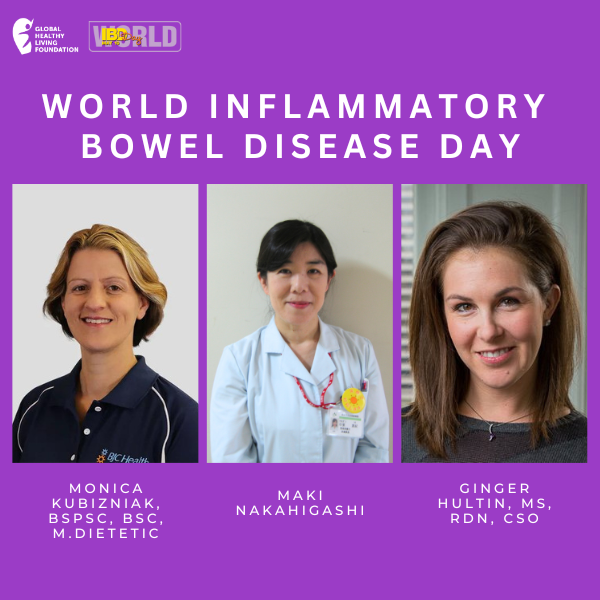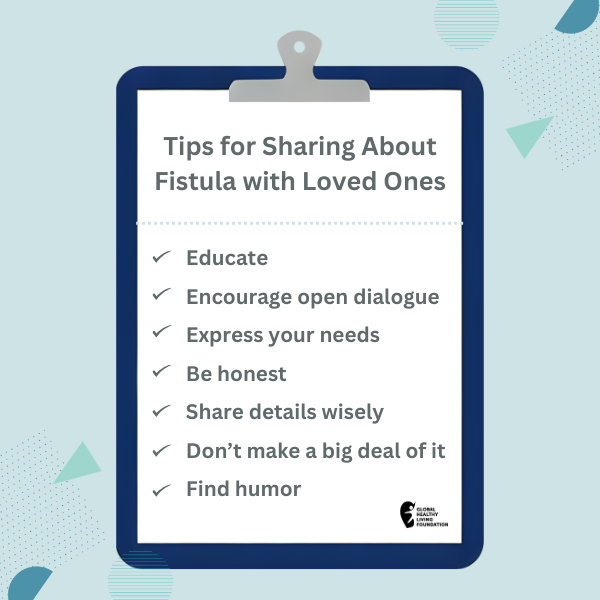In honor of World IBD Day, dietitians from three different continents share tips on managing diet and inflammatory bowel disease (IBD).
Diagnosed with Complex Perianal Fistulas?
Diagnosed with Complex Perianal Fistulas?
January 10, 2023
Barbara Brody

Check out Your Guide to Understanding Complex Perianal Fistula for more information on this topic.
A fistula is an abnormal connection between two different areas of the body. “It’s like a tunnel or gopher hole with two different openings,” says Stefan D. Holubar, MD, IBD Surgery Section Chief and Director of Research in the Department of Colon & Rectal Surgery at the Cleveland Clinic.
Anyone can develop a fistula, but this problem is most common among people with Crohn’s disease, a type of inflammatory bowel disease (IBD) characterized by chronic inflammation of the digestive tract.
Learn more about the symptoms, diagnosis, and management of perianal fistulas for people living with Crohn’s disease.
What Is a Complex Perianal Fistula?
About 25 percent of Crohn’s disease patients develop perianal fistulas, which occur when an ulcer pushes through the lining of the intestine into the perianal area (the area around the anus). This leads to an abnormal channel (fistula) between the intestine and the skin or sphincter muscle in that region.
Perianal fistulas are considered to be complex if they:
- Involve a certain amount of sphincter muscle
- Branch off in more than one direction
- Impact the rectum or vagina
- Get infected
They’re typically very painful, adds Dr. Holubar.
When fistulas get infected, as they often do, the infection occurs in a pus-filled sac known as an abscess. “It’s like a boil anywhere on the body, except the anus has a lot of nerve fibers so it’s very sensitive,” he explains. “[The anus] is designed to tell the difference between solid, liquid, and gas, so when an abscess or boil forms there it’s very painful.”
People who have a fistula might also notice a painful, swollen lump. “It’s almost like an external hemorrhoid,” says Dr. Holubar. If the abscess bursts, then mucus, pus, stool, and blood might drain through it.
If you think you have a fistula you should see a doctor right away. You may require antibiotics (if there’s an infection), and if the fistula itself hasn’t already burst it will likely need to be drained by a surgeon. You might also need surgery to remove the fistula and/or biologic medication to treat the underlying inflammation.
How Fistulas Are Diagnosed
To diagnose a fistula, your provider will examine the area and look for signs of an abscess or external opening that shouldn’t be there. Your gastroenterologist or surgeon may have you kneel on a special table that can be tilted in order to elevate your bottom so it can be more easily examined with a bright light. The doctor might also perform a digital rectal exam (using a gloved finger) or an anoscopy, which entails putting a small tube into the anus and shining a light through it.
This exam might feel strange to you, but don’t be embarrassed: Gastroenterologists and colorectal surgeons do this kind of work every day.
While a gastroenterologist can likely diagnose the fistula, you’ll need a general surgeon or colorectal surgeon to drain it, says Holubar. A colorectal surgeon is preferable because of their specific expertise, but there are only about 2,500 in the U.S., he says. For that reason, “the best doctor to see is the one who can see you quickest.”
Key Questions to Ask Your Doctor When Diagnosed with a Fistula
Being diagnosed with a fistula can be both physically and mentally taxing, but help is available. Some questions to ask your doctor:
Do I need surgery?
The answer will depend on how big it is and other factors, including whether you’ve had other fistulas and what your doctor thinks is happening under the surface of the skin.
Will biologic drugs help?
Crohn’s patients often need biologics to control inflammation in addition to surgery to close the fistula.
There is also research that shows that the biologics you take to treat your IBD may help with closing fistula. Early studies suggested that biologics in the TNF class, such as adalimumab (Humira), infliximab (Remicade), and certolizumab (Cimzia), might resolve fistulas on their own, but newer research suggests that’s unlikely, says Dr. Holubar. However, new drugs are currently being developed that specifically target fistula.
What is the likelihood that my treatment will be successful?
Fistulas are very difficult to treat, even with surgery. While this fact may be disappointing, having realistic expectations from the outset may help you cope better emotionally, says Laurie Keefer, PhD, Director of Psychobehavioral Research, Division of Gastroenterology, at Icahn School of Medicine at Mount Sinai. “Closing fistula tracts is not easy,” she says, adding that you can still have fistulas even if your Crohn’s disease is in remission.
Dr. Holubar agrees that fistulas can’t always be cured, and that outcome varies by patient. Talk to your doctor so you can have realistic expectations about what to expect.
“We try to get rid of them, but often we can’t, or it requires half a dozen surgeries,” says Dr. Holubar. “The goal is often about improving quality of life, which might mean living with a fistula with minimal symptoms… You might come in using eight pads a day [for drainage] and we do surgery and can get you down to one pad.”
Dr. Holubar adds that there has been a lot of excitement about using stem cell therapy for fistulas, but this technique is still experimental and not easy to access in the U.S. at this time unless you’re in a select clinical trial.
How do I get more help and support?
Your gastroenterologist or colorectal surgeon is a great resource, but they might not always have the time to answer questions or provide extra education and support. If you think you’ll need a little more hand-holding and quick response to questions in between appointments, ask if there’s a nurse practitioner or nurse educator in the practice you can reach out to, suggests Dr. Keefer. Pharmacists can also answer your questions, especially about those that pertain to over medications and topical dressings.
For social and emotional support, Tina Aswani-Omprakash, a patient advocate of the blog Own Your Crohn’s and President of the nonprofit charity South Asian IBD Alliance (SAIA), advises asking your doctor if there are any local support groups that cater to people with fistulas, because this topic isn’t routinely discussed in broader IBD/Crohn’s groups. Or search online, including on Facebook, for fistula support groups.
If you’re having an especially hard time coping, consider seeing a therapist in a one-on-one capacity. While any trained mental health professional can assist with depression and anxiety, you may benefit more by working with one who specializes in gastroenterology (gastropsychologist). Ask your gastroenterologist if they can recommend one, or search for an expert near you at https://romegipsych.org/.
If there aren’t any gastropsychologists in your area, your second-best bet may be to work with a health psychologist. This type of mental health clinician is well-versed in treating people with chronic illnesses and will likely have a better understanding of the intersection of mind and body, says Keefer.
How to Feel Better with a Fistula
Fistula symptoms often include pain and drainage. While you’ll need to see a doctor to treat the underlying problem, there are some things you can do at home to help ease your symptoms.
Aswani-Omprakash says that sitz baths may help control the pain and promote fistula drainage. “It’s not a treatment, but it can make you more comfortable,” she says.
Dr. Holubar approves, noting that soaking the area in warm water can provide some relief. “Heat can be soothing,” and you can add Epsom salt if you’d like, he says, noting that it’s generally safe to take over-the-counter pain relievers like ibuprofen or acetaminophen for pain.
He adds that patients usually feel better once an abscess bursts or a doctor drains it, which relieves the pressure. But he cautions against intentionally trying to pop the abscess yourself. “Don’t use a knife or needle at home,” he warns. “You could damage the sphincter and become incontinent.”
If you have drainage, Dr. Holubar advises using period pads, cotton gauze, or even a few layers of toilet paper to line your underwear and keep the area dry. (Remember to change pads/paper whenever they get saturated.)
The bottom line: There are no quick fixes or easy answers when it comes to a fistula diagnosis, but you can take comfort knowing that your health care providers and the greater chronic illness community are there to help along the way.
Gut Culture Podcast
Check out Gut Culture, a podcast that gut checks assumptions about IBD (Inflammatory Bowel Disease) through real conversations with two health care leaders. Listen now.
This article was made possible with support from Takeda and Bristol Myers Squibb.
Anal Fistula. Mayo Clinic. Published January 18, 2018. Accessed August 9, 2020. https://www.mayoclinic.org/diseases-conditions/anal-fistula/care-at-mayo-clinic/mac-20352874.
Interview with Stefan D. Holubar, MD, IBD Surgery Section Chief and Director of Research in the Department of Colon & Rectal Surgery at the Cleveland Clinic.
Interview with Laurie Keefer, PhD, Director of Psychobehavioral Research, Division of Gastroenterology, at Icahn School of Medicine at Mount Sinai.
Surgery for Crohn’s Disease. Crohn’s and Colitis Foundation. Accessed August 9, 2020. https://www.crohnscolitisfoundation.org/what-is-crohns-disease/treatment/surgery.
Panes J, Reinisch W, Rupniewska E, et al. Burden and outcomes for complex perianal fistulas in Crohn’s disease: Systematic review. World Journal of Gastroenterology. 2018. doi: https://doi.org/10.3748/wjg.v24.i42.4821.
SUBSCRIBE TO GHLF
RELATED POST AND PAGES
_
Was this article helpful?
YesNo




